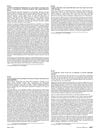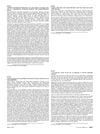 47 citations,
June 2014 in “Journal of Dermatological Treatment”
47 citations,
June 2014 in “Journal of Dermatological Treatment” Most treatments for lichen planopilaris were found to be generally unsatisfactory.
143 citations,
January 2004 in “Journal of Investigative Dermatology Symposium Proceedings” Alopecia areata is an autoimmune disease causing hair loss, treatable with immune-modulating drugs, and linked to genetics.
 68 citations,
January 2022 in “International Journal of Molecular Sciences”
68 citations,
January 2022 in “International Journal of Molecular Sciences” PCOS management includes lifestyle changes and medications, with ongoing research into repurposed drugs for better treatment options.
 February 2010 in “Journal of the American Academy of Dermatology”
February 2010 in “Journal of the American Academy of Dermatology” Umbilical cord blood transplantation improved the boy's symptoms despite complications.
 February 2024 in “Journal of ayurveda and integrated medical sciences”
February 2024 in “Journal of ayurveda and integrated medical sciences” Ayurvedic herbs can help manage Polycystic Ovarian Syndrome (PCOS).
 1 citations,
May 2023 in “Journal of neuroendocrinology”
1 citations,
May 2023 in “Journal of neuroendocrinology” DAVID syndrome is a condition with immune system and hormone deficiencies, needing early diagnosis to avoid serious complications.
 27 citations,
September 2012 in “Dermatologic Clinics”
27 citations,
September 2012 in “Dermatologic Clinics” The document concludes that using specific tools and tests is essential for identifying the cause of hair loss and deciding on the right treatment.
March 2016 in “Actas dermo-sifiliográficas/Actas dermo-sifiliográficas” Stopping the use of a tight headband and using specific treatments led to partial hair regrowth.
4 citations,
December 2021 in “Pharmacological Reports” Metformin is less effective in men with early-onset hair loss.
 September 2023 in “Curēus”
September 2023 in “Curēus” Alopecia areata may be linked to hearing problems, so patients should monitor their hearing.
 November 2024 in “Journal of Investigative Dermatology”
November 2024 in “Journal of Investigative Dermatology” TGF-β signaling is essential for new hair growth after wounds.
 1 citations,
April 2020 in “Baylor University Medical Center Proceedings”
1 citations,
April 2020 in “Baylor University Medical Center Proceedings” Microneedling with triamcinolone helps hair regrowth in ophiasis alopecia areata.
 1 citations,
June 2010 in “Expert Review of Dermatology”
1 citations,
June 2010 in “Expert Review of Dermatology” Covers common skin issues in kids, their diagnosis, treatment, and need for specialist care.
 21 citations,
January 2020 in “General and Comparative Endocrinology”
21 citations,
January 2020 in “General and Comparative Endocrinology” Lack or blocking of SRD5a, a key component in hormone creation, can lead to conditions like pseudohermaphrodism and affect hair growth, bone mass, muscle strength, and reproductive health. More research is needed on its regulation from fertilization to adulthood.
 4 citations,
August 2007 in “PubMed”
4 citations,
August 2007 in “PubMed” A woman lost all her body hair after hepatitis C treatment, but it started to grow back a year after stopping the treatment.
 68 citations,
September 2003 in “British Journal of Dermatology”
68 citations,
September 2003 in “British Journal of Dermatology” Shrinking skin cancer increases the chance of cancer in nearby lymph nodes.
 68 citations,
May 2021 in “Endocrine”
68 citations,
May 2021 in “Endocrine” People with diabetes or obesity should manage their conditions carefully as they have a higher risk of severe COVID-19.
 1 citations,
May 1965 in “Medical Clinics of North America”
1 citations,
May 1965 in “Medical Clinics of North America” Hair growth dysfunction involves various conditions with limited treatment options.
 December 2016 in “Springer eBooks”
December 2016 in “Springer eBooks” A 45-year-old woman with autoimmune diseases experienced patchy hair loss due to alopecia areata, which has no cure but can be treated, with varying success.
 6 citations,
August 1991 in “Pediatric Clinics of North America”
6 citations,
August 1991 in “Pediatric Clinics of North America” The document concludes that various hair and scalp disorders in children have specific treatments and proper diagnosis is essential.
 1 citations,
February 2018 in “InTech eBooks”
1 citations,
February 2018 in “InTech eBooks” PCOS in lean women is a serious health condition with implications beyond fertility, affecting metabolism and increasing cardiovascular disease risk.
 47 citations,
March 2016 in “Journal of dermatology”
47 citations,
March 2016 in “Journal of dermatology” Understanding the genetics of rare inherited ichthyosis syndromes is key for better treatments and genetic counseling.
 January 2017 in “Springer eBooks”
January 2017 in “Springer eBooks” Eating a balanced diet with specific nutrients can help manage menopause symptoms and prevent related health issues.
 February 2010 in “Journal of the American Academy of Dermatology”
February 2010 in “Journal of the American Academy of Dermatology” Lactic acid cream can help improve skin bumps known as eruptive vellus hair cysts.
 1 citations,
June 2023 in “Nutrients”
1 citations,
June 2023 in “Nutrients” Vitamin D deficiency is linked to a higher chance of metabolic syndrome in women with PCOS.
 5 citations,
February 2010 in “Expert Review of Dermatology”
5 citations,
February 2010 in “Expert Review of Dermatology” Treating both the mind and skin together, especially by managing stress, can greatly improve outcomes for skin disorders linked to psychological issues.
 14 citations,
January 2017 in “Elsevier eBooks”
14 citations,
January 2017 in “Elsevier eBooks” CBG may help with various medical conditions but needs more human research to confirm safety and effectiveness.
 5 citations,
October 2016 in “European Journal of Obstetrics & Gynecology and Reproductive Biology”
5 citations,
October 2016 in “European Journal of Obstetrics & Gynecology and Reproductive Biology” Women with PCOS may have a higher risk of respiratory and ear infections due to slower nasal mucociliary clearance.
 6 citations,
June 2011 in “British Journal of Dermatology”
6 citations,
June 2011 in “British Journal of Dermatology” People with alopecia areata have higher levels of RBP4 protein and antibodies against it.
 1 citations,
September 2023 in “Acta dermato-venereologica”
1 citations,
September 2023 in “Acta dermato-venereologica” Certain genetic variants are linked to frontal fibrosing alopecia in Spanish patients.



























